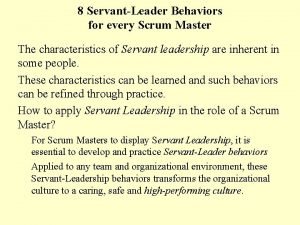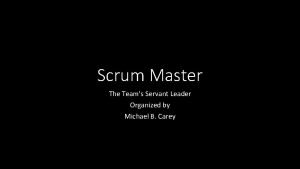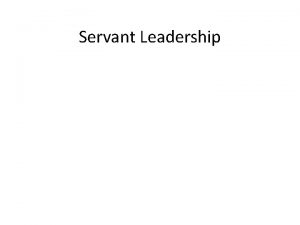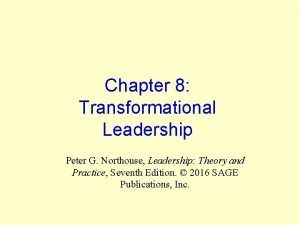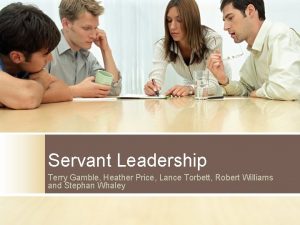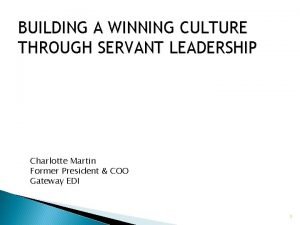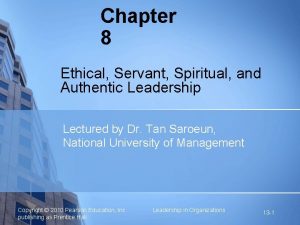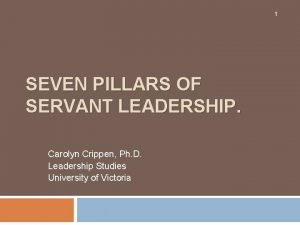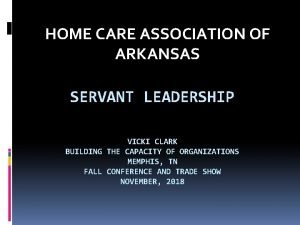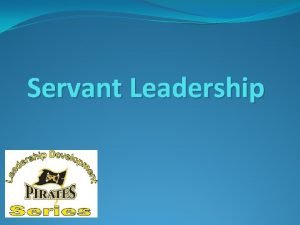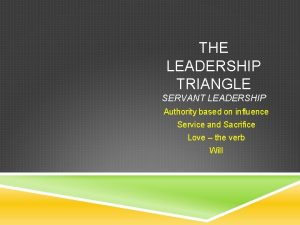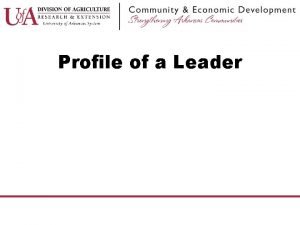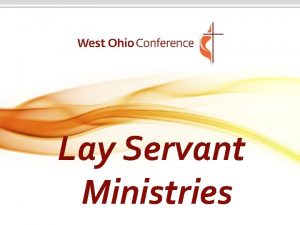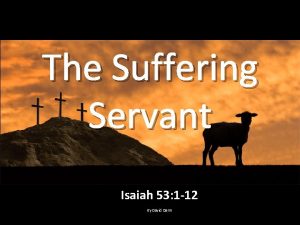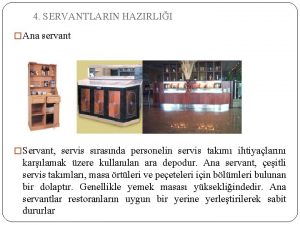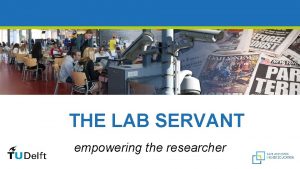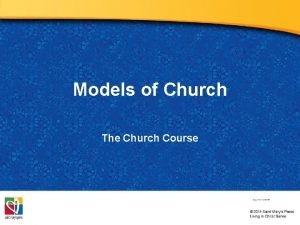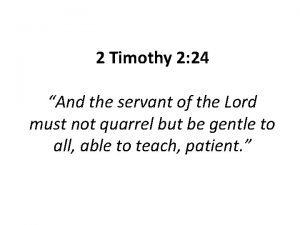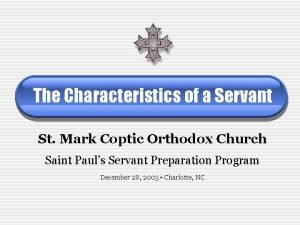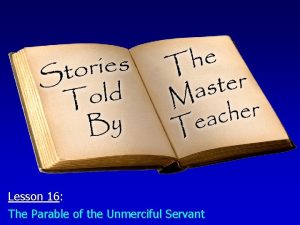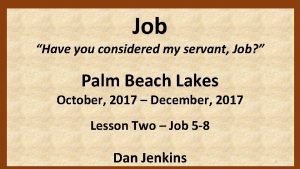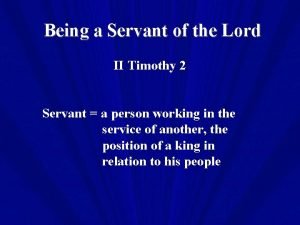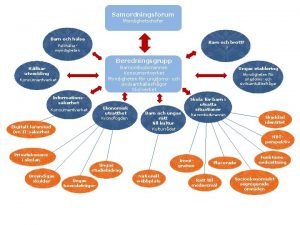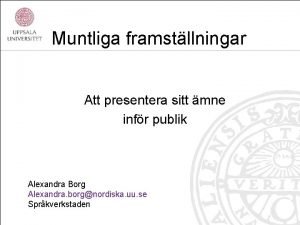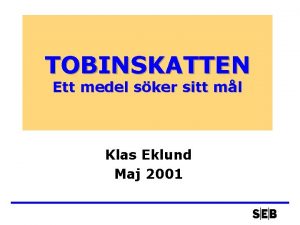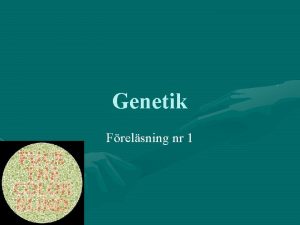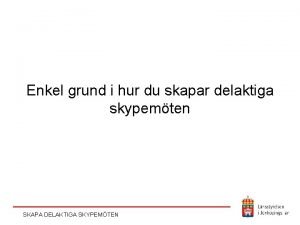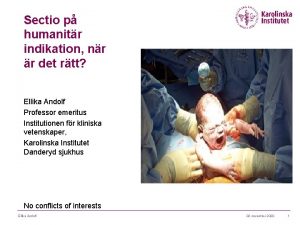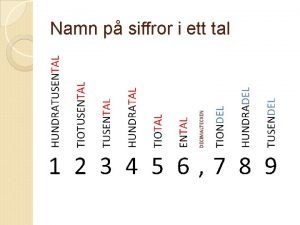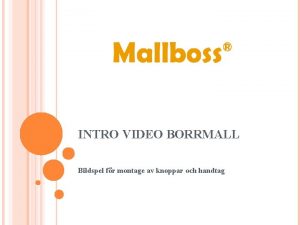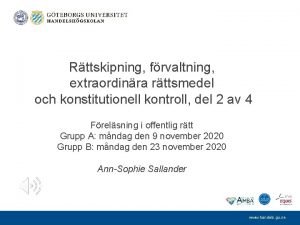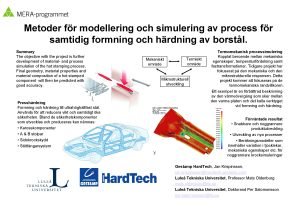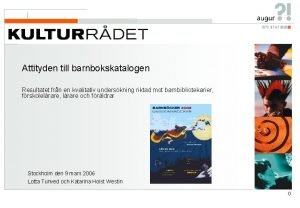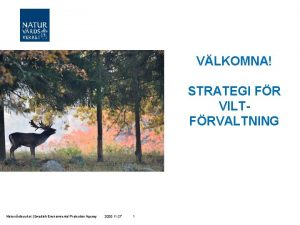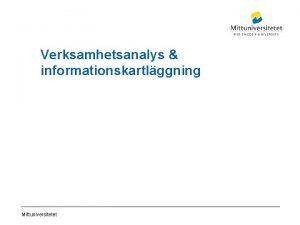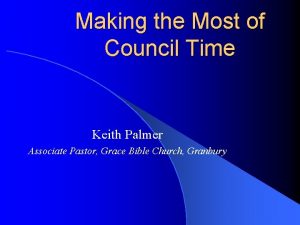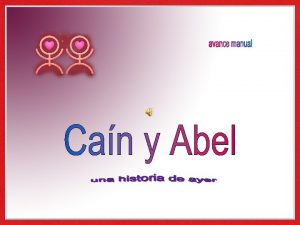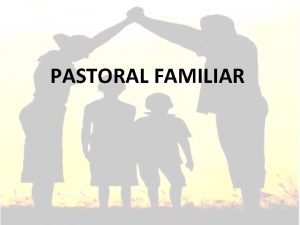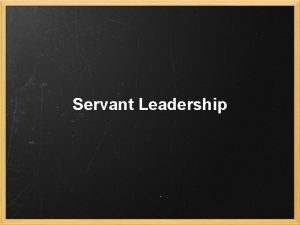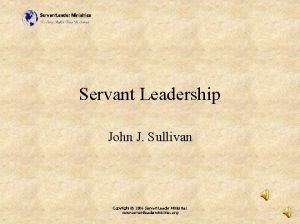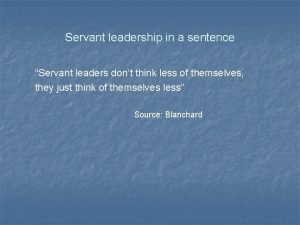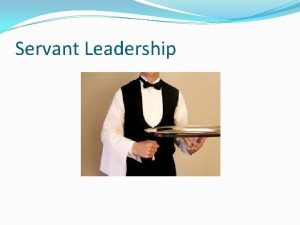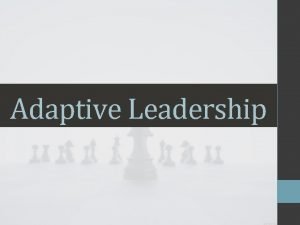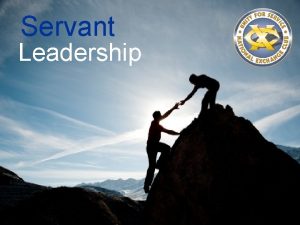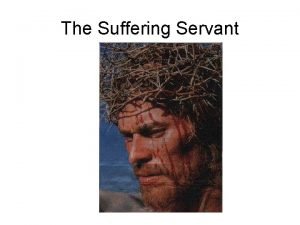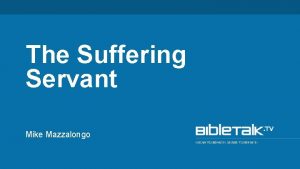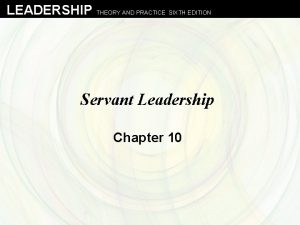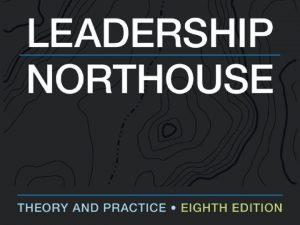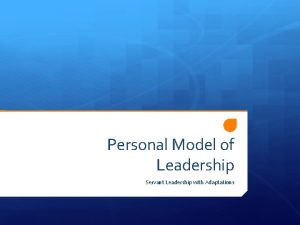The Pastor as Leader Servant Leadership for a











































































































































































- Slides: 171

The Pastor as Leader: Servant Leadership for a Servant Community E. Le. Bron Fairbanks, Nazarene Theological College, Brisbane

Course Vision The overarching vision for this course is for each student to embrace the biblical model of “servant” as the driving force and organizing principle within the individual as she/he seeks to lead a local congregation as a Christian community of faith.

Course Purpose In the context of biblical and theological foundations, and from the perspectives of spiritual, strategic, and skills formation, this course will encourage each participate to a lifelong pursuit of and commitment to personal and congregational understanding of Christian leadership and the unique relationship between theology we profess and the way we lead.

Course Themes The MOTIVATION of servant leadership is grounded in a theology of church and ministry. The LIFESTYLE of servant leadership is by a passion for Christlikeness. characterized The GOAL of servant leadership is reconciliation, transformation, and disciple-making, individually and collectively. The METHOD of servant leadership is example, visioning, “strengths-development, ” and teaching. The PAIN of servant leadership is experienced in tension when good and Godly people collide. The EVIDENCE of servant leadership is in the qualitative growth of the led. the

y a d n o M noon r e t Af n o i t a v i t o M of p i h s r e d a Le

“The Servant leader is a servant first. . . The best test, and difficult to administer, is: do those served grow as persons; do they, while being served, become healthier, wiser, freer, more autonomous, more likely themselves to become servants? And, what is the effect on the least privileged in society; Will they benefit, or at least not be further deprived? Robert Greenleaf

“A Servant leader is one who is a servant first. ”

Three Driving Forces. . . § a VISION of who we are as the people of God; § a PASSION for what we are called to do in the work of God: and § an OBSESSION for how we are to live together as a family of God.

Four priorities. . . 1. Spiritual leadership to the campus community – staff, faculty, senior administrators and students. 2. University-wide strategic thinking, planning, and leading;

Four priorities. . . 3. Christian leadership development – locally, regionally, and worldwide; and 4. Major donor cultivation/gifting and endowment development.

Three questions. . . 1. How can we live together as Christians in a diverse faith community so that our relationships are redemptive and a witness to unbelievers of the reconciling work of God in Christ?

Three questions. . . 2. If “in Christ, all things are made new. ” then how does our relationship with Christ inform and transform the way we lead a Christian community?

Three questions. . . 3. In conflicting situations within the community of believers, when seemingly irreconcilable expectations are placed on the leaders from multiple constituency groups, how does one lead in these situations, really lead, with “the mind of Christ? ”

Seven expressions of the servant leader: 1. The Ministry of Holding One’s Tongue. 2. The Ministry of Meekness. 3. The Ministry of Listening. 4. The Ministry of Active Helpfulness. 5. The Ministry of Bearing Another’s Burdens. 6. The Ministry of Proclaiming the Word of God. 7. The Ministry of Authority. From Life Together – Dietrich Bonheoffer

Christian leadership is humble service to others, for the purpose of enabling them, through teaching and example, to live their lives under the Lordship of Christ, and to understand, accept, and fulfill their ministry to others and their mission to the world. E. Le. Bron Fairbanks

How can my ministry of Christian leadership enable others to fulfill their ministry to others and their mission in the world in the context of a dynamic laboratory of learning how to live together as God’s children?

“Leadership is known by the personalities it enriches, not by those it dominates or captivates. Leadership is not a process of exploitation of others for extraneous ends… The proof of leading is in the qualitative growth of the led as individuals and as group members. ” Dr. Harold Reed


y a d s e u T g n i n r o M e l y t s Life f o p i h s r e d a Le

A Christian Leadership Lifestyle: Instructions: 1. Key Concept: Communication is the greatest single factor affecting one’s personal health and his/her relationship to God and others. 2. Key Question: How can we so live together as Christian that our relationships are redemptive and a witness to unbelievers of the reconciling work of God in Christ? 3. Key Challenge: “Living Worthy of our Calling” – Ephesians 4: 1

A Christian Leadership Lifestyle: 4. Key Insight: “Living the Reconciled Life” – Ephesians 4: 2 -3. 5. Key Principle: “Speaking the Truth in Love” – Ephesians 4: 15 -16. Key Application: Ephesians 4: 25 -32.

A Communication Model for Leading the People of God Ephesians 4 4: 26 (4: 27)

We “SPEAK THE TRUTH IN LOVE” because: WE ARE MEMBERS OF ONE BODY. Ephesians 4: 25

WE SPEAK THE TRUTH IN LOVE BECAUSE WHEN WE DO NOT, SATAN GETS A FOOTHOLD IN OUR LIVES (Ephesians 4: 26 -27) 4: 26

We “SPEAK THE TRUTH IN LOVE” because of the power of words to heal and to affirm. Ephesians 4: 29 c 4: 26 Be Up-building (4: 29)

WHY DO WE “SPEAK THE TRUTH IN LOVE? ” BECAUSE WE HAVE BEEN FORGIVEN IN CHRIST. Ephesians 4: 31 -32) 4: 26 (4: 27) Be Up-building (4: 29)


Conclusion 1. The Spirit of God is deeply concerned with the speech of his people. (Ephesians 4: 30 a) 2. The spiritual life of the leader is the key to maintaining the “unity of the Spirit” in the midst of the multifaceted diversity within a Christian community.

y a d s e u n T o o n r e t Af l a Go of ip h s r e d Lea

Leadership for Congregational Transformation Leadership for congregational transformation involves the equipping of the people of God for ministry and mission. The assignment of transformational leadership is to define, clarify, and prepare each disciple for her or his God-called ministry.

The nature of transformational leadership is outlined in Ephesians 4: 11 -16. A. The context of congregational transformation is “God’s People” or “ministry participation. ” (Ephesians 4: 11). B. The task in congregational transformation is to “prepare God’s people” or “ministry formation. ” (Ephesians 4: 12)

The nature of transformational leadership is outlined in Ephesians 4: 11 -16. C. The goal of congregational transformation is “works of service” or “ministry expression. ” (Ephesians 4: 12). D. The dynamic of congregational transformation is “love within the body of Christ” or “ministry interaction. ” (Ephesians 4: 15 -16). E. The purpose of congregational transformation is a “holiness lifestyle” or Christ-like ministry. ” (Ephesians 4: 13).


THE LEADER AS CATALYST IN TRANSFORMING A COMMUNITY OF FAITH Dreaming and Planning

Planning Cycle

Planning Cycle 1. Understand your mission: OVERARCHING MISSION STATEMENT

Personal Mission Statement “My mission is to be a Christian role model and leader to my family first, and subsequently to the Mount Vernon Nazarene College community in the context of servant and visionary leadership. I will give attention to the financial needs of my family, including retirement, and keep myself physically and emotionally conditioned to enable me to function with maximum effectiveness. I am a growing professional who gives priority time to strategic planning for the institution I serve. In this context, I will enable and energize my family, friends, and colleagues to give their best to their unique roles and assignments. All of my activities initiate from and operate out of a pastoral calling as one who views himself first and foremost as a follower of Jesus who articulates, models, and is committed to His life and teachings. ”

Personal Mission Statement (cont. ) On August 1, 2009, I revised the above personal mission statement to reflect a new phase of ministry to which I had been called following my retirement form MVNU: “I want my ‘senior’ years to be characterized by personal growth, professional development, maturing faith, mentoring leaders, nurturing family, cultivating friendships, compassion for the poor, and passing on to a new generation of Christian leaders, particularly through writing, what has been so freely passed on to me. ”

Planning Cycle 1. Understand your mission: OVERARCHING MISSION STATEMENT Continually review and revise your strategy: REVIEW AND REVISE

Planning Cycle 1. Understand Your mission: OVERARCHING MISSION STATEMENT Continually review and revise your strategy: REVIEW AND REVISE 2. Assess your situation: SITUATION ASSESSMENT

CONSTITUENCY ASSESSMENT (CONGREGATIONAL ANALYSIS, SITUATION ANALYSIS, GROUP NEEDS ASSESSMENT) “UNDERSTANDING WHERE YOU AND YOUR PEOPLE ARE NOW AS THE REALISTIC STARTING POINT FROM WHICH YOU MOVE TO WHERE YOU WANT TO GO, WHY YOU NEED TO MOVE. ”

Flow of Institutional/organizational Planning Process

Planning Cycle 1. Understand Your mission: OVERARCHING MISSION STATEMENT Continually review and revise your strategy: REVIEW AND REVISE 3. Develop your goals: PERSONAL/ PROFESSIONAL 2. Assess your situation: SITUATION ASSESSMENT

ESTABLISH GROWTH GOALS Growth goals are statements of faith for the Christian leader that express clearly what we believe God will do through us. A GOAL should be: 1. Be measurable. 2. Be feasible 3. Be attainable. 4. Contain an action verb. 5. Have a deadline.

Planning Cycle 4. Implement your plan: COMPREHENSIVE IMPLEMENTATION 1. Understand Your mission: OVERARCHING MISSION STATEMENT Continually review and revise your strategy: REVIEW AND REVISE 3. Develop your goals: PERSONAL/ PROFESSIONAL 2. Assess your situation: SITUATION ASSESSMENT

THE LEADER AS CATALYST IN TRANSFORMING A COMMUNITY OF FAITH Organizing and Administering

Christian leaders, by God’s grace, plan for things to happen. And, they organize accordingly. These leaders: ü Are deciders rather than drifters. ü Know where they are going, and how they are going to get there. ü Are results-oriented and not just activity-oriented. ü Are among the 3% who write down their growth goals. ü Pursue goal setting in the context of a broader planning strategy. ü Develop a mission statement. ü Dream great dreams. ü Understand leadership is the transference of vision. ü Are constantly involved in an ongoing analysis of their constituents. ü Establish growth goals. ü Are mission driven. ü Work hard at detailing programs and plans. ü Continually reviews and revises the planning strategy for growth. ü Expect great things from God and attempt great things for God.


THE LEADER AS CATALYST IN TRANSFORMING A COMMUNITY OF FAITH Motivating and Inspiring

Encouraging the Heart The First Essential: Set clear Standards The Second Essential: Expect the Best The Third Essential: Pay Attention The Fourth Essential: Personalize Recognition The Fifth Essential: Tell the Story The Sixth Essential: Celebrate Together The Seventh Essential: Set the Example James Kouzes and Barry Posner

THE LEADER AS CATALYST IN TRANSFORMING A COMMUNITY OF FAITH Evaluating and Encouraging





y a d s e n d e W rning o M d o h t e M of ip h s r e d Lea


Basic Mentoring Questions 1. What are your priorities? 2. How Can I help?



Characteristics and Best Practices of Strong and Effective Governing Boards

e t c a r a h C 1 # c risti Board members understand the role, purpose and function of the board, including board structure

Best Practice: 06 December 2020 – N I E S O N T U O S R E FING 63

Effective Governing Boards … focus on policy formation and mission strategy; not policy implementation and daily operations.

1 a. Three modes of university governance. § Fiduciary mode: § Strategic mode § Representative mode Guard the agenda!

e t c a r a h C 2 # c risti Board members know , communicate, and make decisions in light of the university’s mission , vision and values.

Best Practice: 06 December 2020 n o i s s i M and s e u l a v s u e v dri 67

Realizing Our Intentions “Always, the key question to be asked in Board decision making is: Is this decision important for the long term survival, health, and mission achievement of our institution? After answering this question, then policies and decisions can be made. ” Albert J. Meyer, author. p. 217

3 # c i t s i r e t c a r a h C Board members a sk the r ight questions 06 December 2020 69

Best Practice: 06 December 2020 k n i Th s n o i t s e u q 70

Board Members Ask The Right Questions (value defining and forward thinking…) § Who are we? § Where are we going? § How will we get there? § Why is it important to get there? § How will we know when we get there?

4 # c i t s i r e t c a r a h C Board members u nderstand embrace a Board Policy Manual that contains the Board approved policies for effective and efficient governance of organization. 06 December 2020 72

Best Practice: 06 December 2020 e t i r W it down 73

Board members understand embrace a Board Policy Manual that contains the Board approved policies for effective and efficient governance of the university.

5 # c i t s i r e t c a r a h C Board members c ommunicate with each other and address conflict situations as Christians. 06 December 2020 75

Best Practice: 06 December 2020 h c t a W your s d r o w 76

Board members communicate with each other Christianly (Eph. 4: 2), compassionately, respectfully, directly, and supportively.

Vigorously discuss policy options and make decisions within the board meetings, And communicate board action outside the board meetings with unified support.

6 # c i t s i r e t c a Char Board members listen to the constituency, appreciate the heritage of the school, and model faith development and spiritual formation.

Best Practice: 06 December 2020 e v i t c A e h t f o s e v i t a t n e s repre iversity un 80

Character Counts 1. Speak Gracefully. 2. Live Gratefully. 3. Listen Intently. 4. Forgive Freely. 5. Lead Decisively. 6. Care Deeply. 7. Pray Earnestly. 06 December 2020 81

7 # c i t s i r e t c a r a h C Board members i ntentionally engage in mutual accountability, including systematic board development and evaluation. 06 December 2020 82

Best Practice: 06 December 2020 y t i r Integ s r e t mat 83

Board Development Questions: ► How does work of the board support the overarching mission and vision of the university? ► In what ways have the initiatives of the board contributed to the numerical growth and spiritual development of the university? ► How can the climate of collaboration between the board, council, senate and school leaders be enhanced? ► What are three top institutional challenges for the next year? What short-term and long-term goals have been established in light of these challenges? ► Are the board’s short-term and long-term goals aligned with the institution’s strategic plan? 06 December 2020 84

8 # c i t s i r e t c a r a h C Board members t ake time to process decisions and adhere to the practice of “no surprises” 06 December 2020 85

Best Practice: 06 December 2020 e k a T Time 86

The Board leadership and school leadership work together to plan, set agendas, and develop policy recommendations to the Board. The school leader is involved in any board development process, and the board chair is kept abreast of major developments in the university.

9 # c i t s i r e t c a r a h C Board members e mbrace change and resolve to work through transitions together and united for the good of the Kingdom and the advancement of God’s mission. 06 December 2020 88

Best Practice: 06 December 2020 o T ! s Ye d e r i p s n i iv sion e g n cha 89

0 1 # c i t s i r e t c a r a Ch Board members participate in assessing the effectiveness of prior decisions and collectively make appropriate adjustments. 06 December 2020 90

Best Practice: 06 December 2020 – e s i v e R – w e i v e R – e t a rest w e n e r 91

Planning Cycle 4. Implement your plan: COMPREHENSIVE IMPLEMENTATION 1. Understand Your mission: OVERARCHING MISSION STATEMENT Continually review and revise your strategy: REVIEW AND REVISE 2. Assess your situation: SITUATION ASSESSMENT 3. Develop your goals: 06 December 2020 PERSONAL/ PROFESSIONAL 92

1 1 # c i t s i r e t c a r a Ch Board members are outstanding examples of giving regularly and sacrificially to the church and the university. 06 December 2020 93

Best Practice: 06 December 2020 Role s l e d o m y t i s o r e n e of g 94

Financial donors look first to board members for evidence of their consistent giving to the university -individually and collectively

2 1 # c i t s i r e t c a r a Ch Board members develop new leaders for increased responsibilities and commitment to the organization. 06 December 2020 96

Best Practice: 06 December 2020 Pass it on 97

Reproduce yourself as a passionate advocate for the university. 06 December 2020 98

Use committees as a way to provide opportunities for emerging leaders to take on more responsibility. Board leaders should intentionally mentor and nurture the next generation of board leadership! 06 December 2020 99

In Summary… • Processes to be clarified? • Policies needed? • Questions to be asked? • Plans to be developed? • Projects to be initiated? • Recommendations to the board chair? • Next steps? 06 December 2020 100

Best Practices embraced: 1. 2. 3. 4. 5. 6. 7. 8. 9. 10. 11. 12. NOSE IN – FINGERS OUT MISSION AND VALUES DRIVE US THINK QUESTIONS WRITE IT DOWN WATCH YOUR WORDS ACTIVE REPRESENTATIVES OF THE UNIVERSITY INTEGRITY MATTERS TAKE TIME YES! TO VISION-INSPIRED CHANGE REVIEW-REVISE-RESTATE-RENEW ROLE MODELS OF GENEROSITY PASS IT ON 06 December 2020 101

y a d s e n d e n o W rno e t f A n o i Vis & n i a P of ip h s r e d Lea





Good and godly people often differ on how to reach mutually desired goals. . .

Is it possible. . . to live and work together as Christians so that our relationships are redemptive and a witness to unbelievers?

If “in Christ, all things are made new, ” then how does our relationship with Christ inform and guide us in the way we lead?

In the midst of these conflicting situations. . . What does it mean, really mean, to lead. . . With the mind of Christ?

Seven “anchors” that hold us steady as Christian leaders. . .

Anchor #1: “Speak Gracefully”

Our words can be channels of God’s grace to others Ephesians 4: 29

• • Encourage or discourage Uplift or “putdown” Speak positively or negatively Reflect cultural sensitivity or cultural “blindness” • Focus on the other person, or focus on self

How do others feel when they leave our presence? • Stronger or weaker? • Larger of smaller about themselves? • Confident or hesitant? • Understood or misunderstood? • Affirmed or manipulate? • Blessed or “destroyed”?

“The praise to criticism ratio” 80 / 20

Remember Anchor #1: “Speak Gracefully”

Anchor #2: “Live Gratefully”

Give thanks in all circumstances, for this is God's will for you in Christ Jesus. I Thessalonians 5: 18

We can feel good about ourselves. . . until we compare ourselves with the gifts, talents, and abilities of other people.

What is the antidote to comparison? • Gratitude!

Remember Anchors #1 & #2: “Speak Gracefully” “Live Gratefully”

Anchor #3: “Listen Intently” Listen for more than words. . .

Good and godly people sometimes collide over vision and values.

Theological vision must precede organizational vision.

Growth producing questions: • “What can I learn? How can I change? ” Growth inhibiting questions: • “Why me? What if …? ”

These two ways of thinking and reacting can be diagrammed as follows: Growth Producing Growth Inhibiting

Remember Anchors #1 & #2 & #3: “Speak Gracefully” “Live Gratefully” “Listen Intently”

Anchor #4: “Forgive Freely”

Jesus said, "Father, forgive them, for they do not know what they are doing. " Luke 23: 34

Remember the first four Anchors: “Speak Gracefully” “Live Gratefully” “Listen Intently” “Forgive Freely”

Anchor #5: “Lead Decisively”

It is in the tension between our vision for the future and reality of the present that our decision-making as leaders most often takes place!

We move ahead decisively through • Prayer. . . • Collaboration. . . • Gratitude. . .

In this spirit of humility and brokenness, we move ahead.

To lead decisively with Christian humility demands these skills: • Listening and communicating; • Timing and processing; • Affirming and encouraging; • Asking and inquiring; and • Discernment and delegation.

Remember these 5 Anchors: “Speak Gracefully” “Live Gratefully” “Listen Intently” “Forgive Freely” “Lead Decisively”

Anchor #6: “Care Deeply”

Caring Christians value people, not power.

The final Anchor is this: “Pray Earnestly”

Pray, believing that God can work in me to become the change I desire to see in others.

Focus on the things that unite us, not divide us.

I try to enlarge the vision of my people about their work. I want them to see the big picture of the school.

I really want. . . 1. my words to be grace-giving, lifegenerating and inspiring to others; 2. to be known as a person who is forever grateful; 3. to listen to and respect the people with whom I work, to understand them;

4. to initiate forgiveness when I have been offended; 5. to lead decisively with humility even when there are differences of opinion; 6. my relationship with others to energize and strengthen them in their faith and work.

Ernest Shackleton 1914 Imperial Trans-Antarctic Expedition (LINK)

y a d s r u Th ning r o M e c n e d i Ev f o p i h s r e d a Le


“The concept of hospitality is one of the richest concepts to deepen our insights in the relationship with our fellow human beings. ” “The concept of hospitality may offer a new dimension to our understanding of the healing relationship and the formation of a recreating community. ” Henri Nouwen

“Hospitality is not a subtle invitation to adopt the lifestyle of the host, but the gift of a chance to allow the guest to find his/her own. . . Hospitality wants to offer friendship without binding the guest; and freedom without leaving him alone. ” Henri Nouwen

“Preaching, teaching, counseling, organizing and celebrating – they are all forms of ministry by which we create space for the stranger, space where he can enter into deeper contact with himself, his fellowman, and his God. ” Henri Nouwen

“When I use the term hospitality, therefore, I do not want to limit it to the liberal sense of receiving a stranger into your house. . . It is a fundamental attitude toward our fellow human beings, which can be expressed by a great variety of behavior. ” Henri Nouwen

“Hospitality means primarily the creation of a space where the stranger can enter and become a friend instead of an enemy. . . It is not an attempt to change people, but to offer the free space where change can take place. ” Henri Nouwen

Key Attitudes Attitude of the heart (Ephesians 4: 23) that should increasingly characterize spirit-filled Christians include the following: Ø I love you – you are my brother/sister in Christ. Ø I need you – you are being changed by Christ as I am being changed.

Key Attitudes Ø I respect you – you are different, yet we are one in Christ. Ø I trust you – you desire to serve the same Christ as I. Ø I serve you – I want to minister grace to you.

Key Habits Steven Covey 1. BE PROACTIVE: The Habit of Responsibility. 2. BEGIN WITH THE END IN MIND: The Habit of Leadership. 3. PUT FIRST THINGS FIRST: The Habit of Management.

4. THINK WIN-WIN: The Habit of Mutual Benefit. 5. SEEK FIRST TO UNDERSTAND, THEN TO BE UNDERSTOOD: The Habit of Communication. 6. SYNERGIZE: The Habit of Interdependence. 7. SHARPEN THE SAW: The Habit of Continuous Improvement.

Key Values 1. A Magnanimous spirit 2. A servant mentality 3. A trustworthy character 4. A positive influence 5. A courteous response 6. A giving motivation 7. A grateful attitude

PERSONAL CREED Prime Personal and Professional Principles Succeed at home first. Seek and merit Divine help. Never compromise with honesty. Remember the people involved. Hear both sides before judging.

PERSONAL CREED Prime Personal and Professional Principles Plan tomorrow today. Develop one new proficiency a year. Attain visibility by productivity. Hustle while you wait. Facilitate the success of your colleagues.

Key Personal Goals… Find ways to Ø honor their time. Ø value their work. Ø build their confidence. Ø increase their competence. Ø support their decisions.

Key Personal Goals (cont. ) Find ways to Ø hear their words. Ø network their ideas. Ø affirm their dreams. Ø simplify their assignment. Ø strengthen their faith.

“Communication is the greatest single factor affecting one’s personal health and his relationship to God and to others. ” Adapted from Virginia Satir, Peoplemaking

“To be able to apologize without placating, to disagree without blaming, to be reasonable without being inhuman and boring, to be able to change the subject without distracting gives me greater personal satisfaction, less internal pain, and more opportunities for growth and more satisfactory relationships with others, to say nothing about increase competence. ” Virginia Satir, Peoplemaking

Gandhi (LINK)

y a d i r F g n i n r o M To w e i v e R

Course Themes The MOTIVATION of servant leadership is grounded in a theology of church and ministry. The LIFESTYLE of servant leadership is by a passion for Christlikeness. characterized The GOAL of servant leadership is reconciliation, transformation, and disciple-making, individually and collectively. The METHOD of servant leadership is example, visioning, “strengths-development, ” and teaching. The PAIN of servant leadership is experienced in tension when good and Godly people collide. The EVIDENCE of servant leadership is in the qualitative growth of the led. the

The Servant Song Brother, let me be your servant. Let me be as Christ to you; Pray that I may have the grace to Let you be my servant too. We are pilgrims on a journey; We are brothers on the road. We are here to help each other Walk the mile and bear the load. I will hold the Christ-light for you In the night-time of your fear; I will hold my hand out to you, Speak the peace you long to hear.

I will weep when you are weeping; When you laugh, I’ll laugh with you. I will share your joy and sorrow Till we’ve seen this journey thro’. When we sing to God in heaven, We shall find such harmony. Born of all we’ve known together Of Christ’s love and agony. Sister, let me be your servant. Let me be as Christ to you; Pray that I may have the grace to Let you be my servant too.

Prepared for Board. Serve LLC Edward Le. Bron Fairbanks, founding director Board. Serve. org lfairbanks@boardserve. org Facebook. com/Board. Serve Presented at Nazarene Theological College, Brisbane, Australia May 20 -22, 2013

All rights reserved Please request permission to use this material
 Difference between public servant and civil servant
Difference between public servant and civil servant Safe scrum master servant leader behavior
Safe scrum master servant leader behavior Contemporary leadership styles
Contemporary leadership styles Scrum master servant leader
Scrum master servant leader What is servant leadership
What is servant leadership Servant leadership northouse
Servant leadership northouse Leadership northouse
Leadership northouse Servant leadership vs followership venn diagram
Servant leadership vs followership venn diagram Servant leadership theory
Servant leadership theory Servant leadership
Servant leadership Ethical servant spiritual and authentic leadership
Ethical servant spiritual and authentic leadership 7 pillars of leadership
7 pillars of leadership 12 principles of servant leadership
12 principles of servant leadership What we will cover today
What we will cover today Jan ardui
Jan ardui Servant leadership webinar
Servant leadership webinar Servant leadership triangle
Servant leadership triangle The servant theories
The servant theories Objective of leadership
Objective of leadership Transactional leadership vs transformational leadership
Transactional leadership vs transformational leadership What is a leader
What is a leader What is adaptive leadership theory
What is adaptive leadership theory Enthusiastic beginner disillusioned learner
Enthusiastic beginner disillusioned learner Beadisciple com lay servant ministries
Beadisciple com lay servant ministries Leadership oxford dictionary
Leadership oxford dictionary What does a servant girl witness from a window?
What does a servant girl witness from a window? Isaiah chapter 53
Isaiah chapter 53 Masa servantı
Masa servantı Labservant tu delft login
Labservant tu delft login Parable of the faithful servant
Parable of the faithful servant Sacrament model of the church
Sacrament model of the church Is allah not sufficient for his servant
Is allah not sufficient for his servant The tragedy of romeo and juliet prologue
The tragedy of romeo and juliet prologue 1 timothy 2:24
1 timothy 2:24 Your faithful servant
Your faithful servant Characteristics of a servant of god
Characteristics of a servant of god Servant file
Servant file The joshua commission
The joshua commission Multon nedir
Multon nedir Parable of the unforgiving servant lesson
Parable of the unforgiving servant lesson Odisha conduct rules 1959
Odisha conduct rules 1959 Act 5, scene 1 romeo and juliet summary
Act 5, scene 1 romeo and juliet summary Who is thomas putnam's servant
Who is thomas putnam's servant Macbeth character map
Macbeth character map Who is the proctors new servant
Who is the proctors new servant The crucible character notes
The crucible character notes Well done good and faithful servant niv
Well done good and faithful servant niv Have you considered my servant job
Have you considered my servant job Faithful servant of god
Faithful servant of god Shylock's servant
Shylock's servant I am the lord's servant
I am the lord's servant Ordinary servant
Ordinary servant Romeo and juliet jeopardy
Romeo and juliet jeopardy Inköpsprocessen steg för steg
Inköpsprocessen steg för steg Påbyggnader för flakfordon
Påbyggnader för flakfordon En lathund för arbete med kontinuitetshantering
En lathund för arbete med kontinuitetshantering A gastrica
A gastrica Egg för emanuel
Egg för emanuel Tack för att ni har lyssnat
Tack för att ni har lyssnat Relativ standardavvikelse formel
Relativ standardavvikelse formel Rutin för avvikelsehantering
Rutin för avvikelsehantering Treserva lathund
Treserva lathund Myndigheten för delaktighet
Myndigheten för delaktighet Presentera för publik crossboss
Presentera för publik crossboss Kung dog 1611
Kung dog 1611 Tack för att ni lyssnade
Tack för att ni lyssnade Debatt mall
Debatt mall Tobinskatten för och nackdelar
Tobinskatten för och nackdelar Tack för att ni lyssnade bild
Tack för att ni lyssnade bild Referat mall
Referat mall Karttecken brunn
Karttecken brunn Var finns arvsanlagen
Var finns arvsanlagen Lågenergihus nyproduktion
Lågenergihus nyproduktion Rbk fuktmätning
Rbk fuktmätning Lufttryck formel
Lufttryck formel Underlag för särskild löneskatt på pensionskostnader
Underlag för särskild löneskatt på pensionskostnader Vad är densitet
Vad är densitet Elektronik för barn
Elektronik för barn Tack för att ni har lyssnat
Tack för att ni har lyssnat Smärtskolan kunskap för livet
Smärtskolan kunskap för livet Argument för teckenspråk som minoritetsspråk
Argument för teckenspråk som minoritetsspråk Luftstrupen för medicinare
Luftstrupen för medicinare Trög för kemist
Trög för kemist För och nackdelar med firo
För och nackdelar med firo Humanitr
Humanitr Avrunda decimaltal
Avrunda decimaltal Toppslätskivling effekt
Toppslätskivling effekt Vad står k.r.å.k.a.n för
Vad står k.r.å.k.a.n för Redogör för vad psykologi är
Redogör för vad psykologi är Borra hål för knoppar
Borra hål för knoppar Mat för idrottare
Mat för idrottare Lek med former i förskolan
Lek med former i förskolan Bris för vuxna
Bris för vuxna Etik och ledarskap etisk kod för chefer
Etik och ledarskap etisk kod för chefer Publik sektor
Publik sektor Datorkunskap för nybörjare
Datorkunskap för nybörjare Vad kallas den mantel som bars av kvinnor i antikens rom
Vad kallas den mantel som bars av kvinnor i antikens rom Rita perspektiv
Rita perspektiv Kontinuitetshantering
Kontinuitetshantering Ministerstyre för och nackdelar
Ministerstyre för och nackdelar Plats för toran ark
Plats för toran ark Bästa kameran för astrofoto
Bästa kameran för astrofoto Tillitsbaserad ledning
Tillitsbaserad ledning Nyckelkompetenser för livslångt lärande
Nyckelkompetenser för livslångt lärande Lyrik lyra
Lyrik lyra Personlig tidbok fylla i
Personlig tidbok fylla i Mästare lärling modell
Mästare lärling modell Varför kallas perioden 1918-1939 för mellankrigstiden?
Varför kallas perioden 1918-1939 för mellankrigstiden? Matematisk modellering eksempel
Matematisk modellering eksempel Vilken grundregel finns det för tronföljden i sverige?
Vilken grundregel finns det för tronföljden i sverige? Verktyg för automatisering av utbetalningar
Verktyg för automatisering av utbetalningar Shaktismen
Shaktismen Big brother rösta
Big brother rösta Aktiv exspektans
Aktiv exspektans Bo bergman jag fryser om dina händer
Bo bergman jag fryser om dina händer Strategi för svensk viltförvaltning
Strategi för svensk viltförvaltning Ro i rom pax
Ro i rom pax Stig kerman
Stig kerman Ledningssystem för verksamhetsinformation
Ledningssystem för verksamhetsinformation Typiska drag för en novell
Typiska drag för en novell Tack för att ni har lyssnat
Tack för att ni har lyssnat Läkarutlåtande för livränta
Läkarutlåtande för livränta Centrum för kunskap och säkerhet
Centrum för kunskap och säkerhet Vẽ hình chiếu đứng bằng cạnh của vật thể
Vẽ hình chiếu đứng bằng cạnh của vật thể đại từ thay thế
đại từ thay thế Quá trình desamine hóa có thể tạo ra
Quá trình desamine hóa có thể tạo ra Môn thể thao bắt đầu bằng chữ đua
Môn thể thao bắt đầu bằng chữ đua Hình ảnh bộ gõ cơ thể búng tay
Hình ảnh bộ gõ cơ thể búng tay Khi nào hổ mẹ dạy hổ con săn mồi
Khi nào hổ mẹ dạy hổ con săn mồi Các loại đột biến cấu trúc nhiễm sắc thể
Các loại đột biến cấu trúc nhiễm sắc thể Biện pháp chống mỏi cơ
Biện pháp chống mỏi cơ Trời xanh đây là của chúng ta thể thơ
Trời xanh đây là của chúng ta thể thơ độ dài liên kết
độ dài liên kết Chó sói
Chó sói Thiếu nhi thế giới liên hoan
Thiếu nhi thế giới liên hoan Phối cảnh
Phối cảnh điện thế nghỉ
điện thế nghỉ Một số thể thơ truyền thống
Một số thể thơ truyền thống Thế nào là hệ số cao nhất
Thế nào là hệ số cao nhất Slidetodoc
Slidetodoc Sơ đồ cơ thể người
Sơ đồ cơ thể người Số nguyên là gì
Số nguyên là gì đặc điểm cơ thể của người tối cổ
đặc điểm cơ thể của người tối cổ Các châu lục và đại dương trên thế giới
Các châu lục và đại dương trên thế giới Chụp phim tư thế worms-breton
Chụp phim tư thế worms-breton ưu thế lai là gì
ưu thế lai là gì Tư thế ngồi viết
Tư thế ngồi viết Thẻ vin
Thẻ vin Cái miệng nó xinh thế chỉ nói điều hay thôi
Cái miệng nó xinh thế chỉ nói điều hay thôi Các châu lục và đại dương trên thế giới
Các châu lục và đại dương trên thế giới Mật thư tọa độ 5x5
Mật thư tọa độ 5x5 Bổ thể
Bổ thể Từ ngữ thể hiện lòng nhân hậu
Từ ngữ thể hiện lòng nhân hậu Tư thế ngồi viết
Tư thế ngồi viết Giọng cùng tên là
Giọng cùng tên là Thơ thất ngôn tứ tuyệt đường luật
Thơ thất ngôn tứ tuyệt đường luật Chúa yêu trần thế alleluia
Chúa yêu trần thế alleluia Khi nào hổ con có thể sống độc lập
Khi nào hổ con có thể sống độc lập Diễn thế sinh thái là
Diễn thế sinh thái là Vẽ hình chiếu vuông góc của vật thể sau
Vẽ hình chiếu vuông góc của vật thể sau Cong thức tính động năng
Cong thức tính động năng 101012 bằng
101012 bằng Tỉ lệ cơ thể trẻ em
Tỉ lệ cơ thể trẻ em Thế nào là mạng điện lắp đặt kiểu nổi
Thế nào là mạng điện lắp đặt kiểu nổi Lời thề hippocrates
Lời thề hippocrates Arte paleocristiano el buen pastor
Arte paleocristiano el buen pastor Precious name oh how sweet
Precious name oh how sweet Pastor andy wood
Pastor andy wood Keith palmer pastor
Keith palmer pastor Cain era pastor
Cain era pastor 7 anos de pastor jacob servia
7 anos de pastor jacob servia Que es una pastoral familiar
Que es una pastoral familiar

